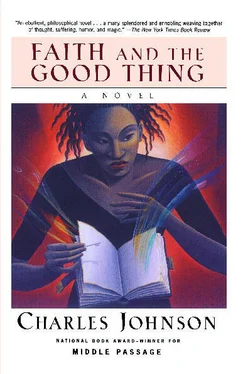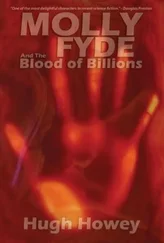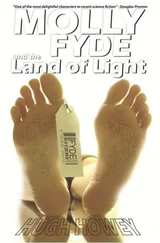“Then,” she groaned, “he’ll stay, I guess.”
Satisfied, Ragsdale excused himself and crossed the room. Faith was certain she was going to be sick. The constant repetition of “Jingle Bells” on the scratchy record player in the corner, the eruption of laughter from the blanched wives of the employees as they tottered around the room, and the slow but dulling effect of the alcohol — all this had her at her tether. Toward the end of the evening, Maxwell returned to her and led her to a corner of the room beside the sweet-smelling Christmas tree.
“Lowell’s got his nose open for you,” he said. He fished into his pocket and handed her the car keys. “I’ll take a cab home,” he said.
“What does that mean?” She had never seen him like this. He was so drunk his lower lip was hanging like an oven lid. He must have left and vomited somewhere, perhaps in the employee’s bathroom, because gray kernels of undigested food — cheese crackers and chips — were caked in his skimpy mustache and spotted his white collar. His eyes, despite all this, were frighteningly clear.
“It means you’re going to carry the ball for once.” Maxwell hiccoughed and winced. He held his chest as though in pain. “You owe me some thing, Faith! And it doesn’t make much difference since you’re a goddamn wh—”
“Isaac!” She wanted to hit him, to tear at his red eyes and scream until the intensity of her voice or shame caused him to dissolve, fade away or disappear. She looked over her shoulder. The city room was almost empty. Crushed paper cups, some smeared with lipstick stains, were scattered across the floor between the even rows of desks and buzzing wire-copy machines. Standing by the door, sipping from his cup, was the old copy editor: Lowell — thin, with knobby tree-limb arms. The lower half of his face, to tell the truth, looked like the impression made by a horse’s hoof, sunken, shapeless, and slipping into the collar of his shirt as though his chin and collar were made in the same mold.
“I don’t wanna argue,” Maxwell said. “I don’t wanna fight no more. ”
Neither did Faith. She took the car keys from his open pink palm and walked toward the door as Lowell turned toward her. He was incredibly drunk, his shirttail was outside his pants, and his trousers bulged with an erection as hard as Chinese arithmetic. He smiled.
Six-fifteen.
Faith sped up her preparations. Maxwell would be back at precisely seven. He was usually punctual, never a moment late unless he’d been drinking after work. There was really no way to hate him. For he, too, was dead living, and went through each day, not bumping into other things in the darkness of the cave, but swinging at them. The deferral of his column had nearly ruined his morale. The day after it was tabled indefinitely he came to work an hour late. He told her over dinner that night that the telephone on his desk had rung and he’d taken a story about the marriage of the daughter of one of Chicago’s most powerful city officials. Lucius Bitch. YOUNG BITCH MARRIES was the way Maxwell wrote the headline for the evening edition. Nothing came of that until the following morning when he arrived at the office to find every telephone extension in the building screaming. Ragsdale had already yanked out half his gray hair, Cummings was champing aspirin and tranquilizers like candy.
“Didn’t you know we endorsed him last year?” Lowell shouted across the room from his desk.
Maxwell shrugged his shoulders. He’d already had three drinks that morning, but wanted another. “Yeah,” he said, “I wrote the editorial, remember? SENTRY SELECTS BITCH, right?”
Lowell moaned; he buried his head in his trembling hands. “It’s Fitch, Isaac! Lucius Fitch !”
That was hardly the worst of it. A month later Maxwell came to work and found a uniformed policeman standing beside his desk. He stopped in his tracks, dropped his briefcase, and looked at Cummings, Lowell, and Ragsdale. They kept their eyes averted from him, fixed on the sheets of morning copy strewn across their desks.
“What is this?” Maxwell shouted. He fumbled in his coat pocket for his plastic respirator. “What’s going on here?”
The police officer stepped toward him. He had a round face and clear blue eyes. Dressed in blue, he looked somewhat like a robot and sounded like one when he said, “You’ll have to come with me, Mr. Maxwell.”
Maxwell jumped back three feet. “For what ?”
The officer unfolded a sheet of official-looking paper. “The complainants state that yesterday you checked out company car number fifteen at nine hundred.” He looked up at Maxwell. “It’s still missing.”
“I never touched any of those cars!” Maxwell shouted. “Fred,” he pleaded to Ragsdale, “is that your complaint?”
Ragsdale looked up with a straight and sad face, then took a sip from the coffee on his desk. It was cold and covered with white scum. “The parking-lot attendant says he saw you take the car yesterday. He said he asked you where you were going, and you told him it was none of his damn business.” Ragsdale looked away. “I’m sorry, Isaac. ”
The whole world caved in. The officer took Maxwell’s arm and led him toward the front door. They stopped to let a wiry young black in a pink tank top and blue bellbottoms squeeze between them. Maxwell recognized the boy as the same one who tried to monopolize Faith’s time at the Christmas party. Straightaway he went to the bulletin board where the company car keys hung on rows of silver hooks. Maxwell broke free from the officer’s grip and raced to the board. He snatched the car key from the boy’s hand.
“What car was taken?” he called to Cummings.
“Fifteen.”
“This is it!” Maxwell shouted. He raised the key high in the air like a standard and looked at the confused boy beside him.
“I had to drop off some evening papers uptown,” the boy said, a frayed toothpick stuck in the left corner of his mouth. “It was late so I took the car home with me.”
Maxwell, almost sobbing, hugged the boy like a brother.
He was certain his editors were out to get him, just waiting for him to make some mistake. Faith remembered listening to his complaints at night. She guessed it was her ability to listen that kept their marriage together. That, and “carrying the ball.” She turned off the stove and set the dinner table with their best, and as of yet unpaid-for, silverware. Then she went to her bedroom to sit in front of her mirror for half an hour, struggling with IT until she heard Maxwell’s key turn in the front door.
He called, “We’re here, honey!”
“I’ll be out in a minute.” Faith struggled with the zipper to her dress, checked herself once in her mirror, and stepped into the hallway. She could hear them talking in the front room, Maxwell and the ex-prisoner. Something slowed her steps, bringing her to a halt halfway down the hall. She listened. Alternating with her husband’s voice was that of the other — warmer, slower, somehow more self-assured. It alarmed her, not because it rang resonant with more power than Maxwell’s, or because it belonged to a man who’d spent, she’d heard, his last three years in prison. But because it sounded, strangely enough, of Georgia.
She entered the front room, stopping feet from them as they talked. Maxwell and his guest faced her, the latter stretching out his thick, calloused hand. Maxwell was in his favorite stance, his right hand playing with a loose thread on his jacket. As she reached for that rough hand hung in the air Faith felt her feet sinking through the thick carpet, through the floor, the earth, perhaps, down through its many-colored layers to the white-hot center of the world. Sometimes, children, you’ll get that feeling. You’ll be listening to someone and swear you’ve heard the same words he’s saying sometime before; you’ll be some place where you’ve never been, and swear ’fore God you’ve been there. You’ll catch your breath like Faith did. You’ll blink to clear your eyes. She did that, too. And if you’re like Faith your lips will turn up in a smile, because you’ll know reality is simply a rhythm, repeating itself, flashing the same faces into the world in different ages and different times and always — as far as your life is concerned — returning you, from time to time, to some touchstone from which your heart has tarried but to which it must always return.
Читать дальше












